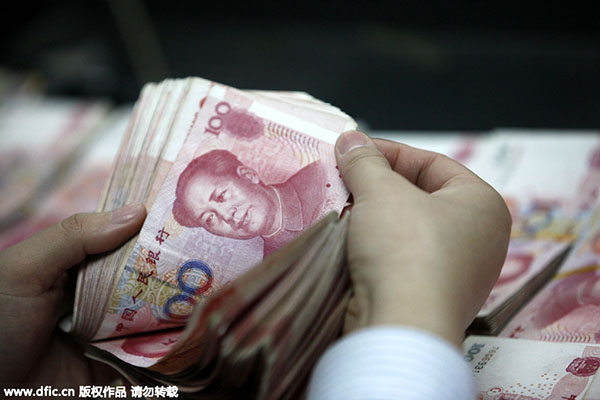Income tax reform can help boost growth
Updated: 2015-11-24 07:51
(China Daily)
|
|||||||||||
 |
|
A Chinese clerk counts RMB (renminbi) yuan banknotes at a bank in Huaibei city, East China's Anhui province, January 22, 2015.[Photo/IC] |
Policymakers have been fairly quick in cutting taxes to cushion domestic businesses against the ongoing economic slowdown. But they should also aggressively promote much-talked about reforms in individual income tax to facilitate the country's transition toward consumption-led growth.
To help domestic enterprises survive the country's painful but necessary economic transformation, value-added tax reforms were introduced that have saved hundreds of billions of yuan for companies in sectors including transportation and telecommunications and cut the tax bills for small businesses by 48.6 billion yuan ($7.71 billion) in the first half of this year.
The short-term effect of such tax cuts for businesses is obvious, but it will be limited if the potential of Chinese consumers is not realized as soon as possible.
Thus individual income tax reforms to both narrow income disparity and encourage consumption have become more urgent than ever, if domestic consumption is to play an increasingly bigger role in driving the country's economic growth.
The central government has made clear its intention to establish an individual income tax system in which taxable income is defined in both comprehensive and categorized ways, and policymakers are busy preparing a draft of such reforms.
In June 2011, the country increased the threshold of individual income tax to 3,500 yuan, reducing the tax burden of the middle- and low-income groups. But the continuous growth of nominal income levels warrants either raising the individual income tax threshold or an indexed threshold.
More importantly, both the rapid aging of the Chinese population and the introduction of a new policy to allow all couples to have two children justify some significant changes to the current individual income tax to help wage-earners better cope with the challenges of supporting elderly family members and raising more kids.
In the absence of needed tax incentives, many Chinese wage-earners will choose to save in order to cover the rising costs of healthcare for the elderly, and the number of couples who will opt to have a second child is also likely to fall short of expectations as couples balk at the cost of raising children.
Since cuts in the individual income tax would help alleviate the heavy burden Chinese families have to shoulder looking after elderly relatives and raising children, policymakers should press ahead with such tax reform to give domestic consumers confidence to spend more and so fuel consumption-led growth.
Related Stories
Chinese economists urge tax reductions 2015-11-23 15:08
Innovative, small businesses get multibillion-dollar tax cuts in China 2015-11-20 09:59
Tax cut will move Chinese economy into new growth cycle 2015-11-18 09:06
Tax to be levied on overseas online purchases 2015-11-17 07:56
Measures aim to tackle tax evasion 2015-11-17 07:54
Tax reduction on R&D to further expand 2015-10-23 17:41
Today's Top News
Fiscal subsidies and contributions can bridge pension fund deficit
Timeline set for 16-country trade pact
At least 27 dead after Islamists seize Mali hotel
Talking the talk
170 taken hostage in Mali, Chinese tourists trapped
China pledges to achieve cuts to greenhouse gases
CGN considers solar power foray in France
Suspected mastermind of Paris attacks died
Hot Topics
Lunar probe , China growth forecasts, Emission rules get tougher, China seen through 'colored lens', International board,
Editor's Picks

|

|

|

|

|

|






